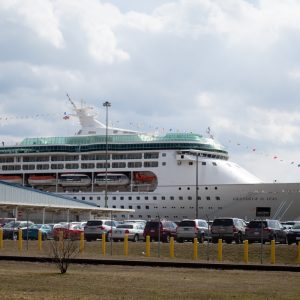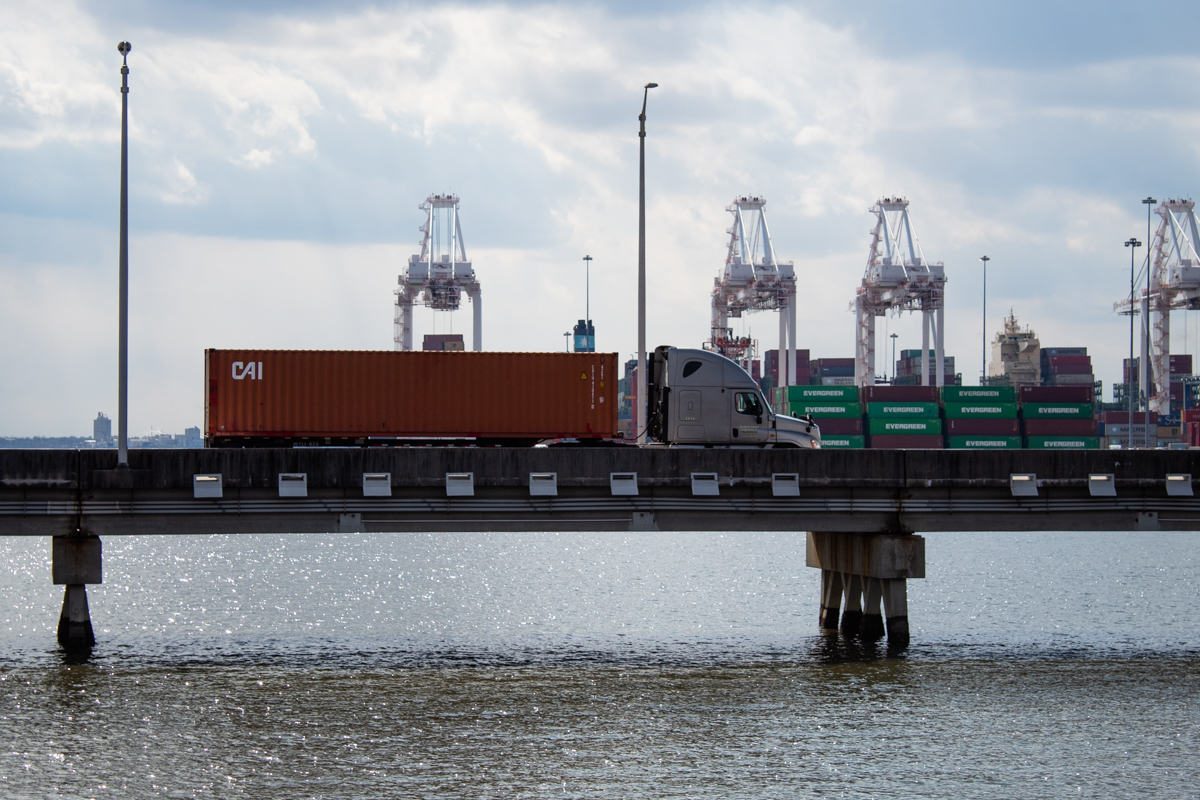ANNAPOLIS, MARYLAND — Marylanders might notice fewer goods in stores by mid-March or April due to the effects of the novel coronavirus on the global supply chain, the acting director of the Port of Baltimore told lawmakers Friday.
An expected shipment to the Port of Baltimore has been cancelled for the first time because of the virus — due to a lack of goods.
Meanwhile, state leaders in Annapolis are urging Marylanders not to panic.
The ship, which typically would contain 1,800-2,000 large shipping containers of household goods, was expected to arrive in late March after stops at Asian ports including China, an official said. Without enough merchandise to ship out, it is no longer scheduled to sail to Baltimore.
Less merchandise from China means fewer goods like food, clothing and “big box” electronic goods will flow into stores, Acting Executive Director David Thomas told Capital News Service. He said Friday morning that the West Coast is getting hit the hardest with 81 cancelled shipments so far.
“That is going to have a significant impact,” Thomas told lawmakers. “When you start going to the store, eventually, you’re going to have an issue where what you want to buy, the right size, the right color — whatever — is not going to be there.”
About 2,000 ships dock at The Port of Baltimore each year. The proportion of ships coming from Asia has risen in the last decade to about 30% of the port’s arrivals, a port spokesman told Capital News Service.
Thomas said U.S. companies don’t have goods to ship here because their Chinese factories haven’t been producing as many goods as that country deals with the outbreak.
The risk of transmission from sailors to dock workers is less of a worry in Baltimore because the virus is thought to have a maximum 14-day incubation period, according to the Maryland Health Department website. That’s far shorter than the 37 days it takes to make it to Baltimore from China by cargo ship. Vessels are also required to notify the U.S. Coast Guard 96 hours before they enter U.S. waters and say whether anyone on board is sick.
The company that operates the Seagirt Marine Terminal, Ports America Chesapeake, is cutting back their hours of operation starting Monday because fewer goods are arriving, a Port of Baltimore spokesperson said Friday. The port has six public terminals.
Still, Thomas could not say how much this could impact the Maryland economy.
“It’s really difficult to say at this point,” Thomas told Capital News Service. “I don’t think my crystal ball is that clear.”

The 95 cruise ships that operate out of the Port of Baltimore are less of a concern because they are a “closed-loop system” that generally sends United States citizens to the Bahamas and other Caribbean locations before looping back, Thomas said.
Still, the Port of Baltimore announced Thursday new measures being taken to combat the virus among passengers.
Both Carnival and Royal Caribbean cruise lines have begun screening for anyone who has been to areas impacted by the coronavirus or had contact with someone who has. If the answer is yes to either question, that passenger won’t be allowed on the cruise. The terminal operator, Intercruises, will provide additional medical screening to passengers with passports from impacted areas.
During a press conference Thursday at the state’s Maryland Emergency Management Agency in Reisterstown, Gov. Larry Hogan, R, announced he would submit a $10 million supplemental budget to cover emergency preparedness expenses.
As of Friday, five Maryland patients had been approved for COVID-19 testing, with three cases pending at the Centers for Disease Control, according to the Maryland Department of Health. Two other cases in Maryland have already tested negative for COVID-19.
The virus has been confirmed in six U.S. states, not including cases of people who have returned from overseas via U.S. State Department flights, according to the CDC.
During a press conference Friday, the World Health Organization announced China reported 329 cases in the last 24 hours, the lowest total in more than a month. So far, more than 78,000 cases have been reported in China, with more than 4,300 cases and 67 deaths in 49 other countries, said Tedros Adhanom Ghebreyesus, the WHO Director-General.
Sen. Clarence Lam, D-Howard and Baltimore counties, told Capital News Service Friday “the economic concerns are high” for a potential novel coronavirus outbreak in Maryland.
Lam said the state’s location puts it at the crossroads of many different economic sectors on the East Coast.
He added that the Port of Baltimore, Baltimore/Washington International Thurgood Marshall Airport and the state’s service industry put it at a greater risk of economic harm, but repeatedly urged Marylanders to stay calm.
“Until we have a better sense of the spread of the disease, I think the public should not panic at this point.”
Lam, a physician who also works as an assistant scientist at the Johns Hopkins Bloomberg School of Public Health, said he wouldn’t be surprised if the World Health Organization categorized the outbreak as a pandemic “fairly soon,” given its trajectory.
Senate President Bill Ferguson also urged Marylanders not to panic in remarks he made from the Senate rostrum on Friday. He emphasized that the Senate would work closely with Hogan’s office on “common talking points.”
“The biggest concern that we have right now is the panic,” Ferguson, D-Baltimore, said. “It is really important that we are prepared and so that, in the case there is an issue with the virus, that we are ready to handle it as we would any other issue.”
Lam said the best ways to help prevent the spread of the disease are the same “common sense” precautions used for the common cold and flu, such as washing hands, covering the mouth when coughing or sneezing and staying home if someone begins to show symptoms.
“People can take very basic precautionary practices that prevent them from getting the virus,” he said.
But Lam stressed the importance of remaining calm and emphasized there have been no confirmed cases in Maryland and limited cases nationwide.
He urged people to avoid a run on antiviral medications in case health workers need them but suggested that families should plan how they will communicate with each other if common communication methods don’t work. He said people should have a supply of medication they require for chronic issues and other basic supplies they may need.
Lam said it was important for people to avoid the novel coronavirus “hype” and make sure they are receiving factual information as the situation develops.
“There’s still a lot we don’t know at this point,” Lam said. “People need to be aware of what’s going on and stay informed.”


You must be logged in to post a comment.